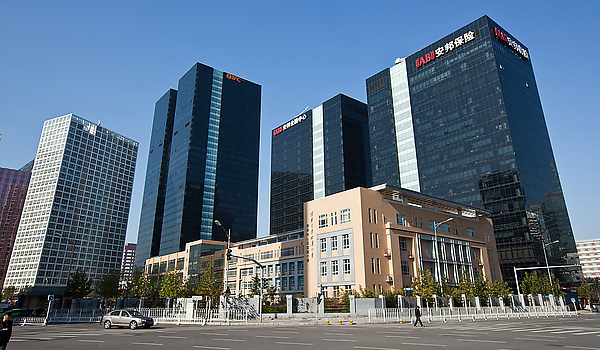(单词翻译:单击)
A previously obscure Chinese insurance company, whose global shopping spree has raised eyebrows in the investment world, is pursuing a Warren Buffett-like strategy in which investment returns drive growth and insurance plays only a minor role.
中国一家以往鲜为人知、但近期因为在全球频频收购而引起投资界瞩目的保险公司,正奉行一项类似于沃伦•巴菲特(Warren Buffett)的战略,即借助投资回报推动增长,让保险业务扮演次要角色。

This month alone, Beijing-based Anbang Insurance Group announced the purchase of Manhattan’s Waldorf Astoria hotel for $1.95bn, and bought Fidea, a Belgian insurer, for an undisclosed price. And South Korean media have reported that Anbang is considering acquiring a controlling stake in state-run Woori Bank.
仅这个月,总部位于北京的安邦保险集团(Anbang Insurance Group)就宣布以19.5亿美元收购曼哈顿的华尔道夫酒店(Waldorf Astoria hotel),还以金额未公开的价格收购了比利时保险公司Fidea。而韩国媒体报道称,安邦正考虑收购该国国营的友利银行(Woori Bank)的控股股份。
Such ambitious investment may seem strange for a company that ranks eighth among Chinese life assurers with only a 3.6 per cent market share, far below leaders China Life and Ping An, which control 25 and 14 per cent respectively.
对于一家在本土寿险市场位居第八的公司而言,这种雄心勃勃的投资可能看起来很怪。安邦在中国寿险市场所占份额只有3.6%,远低于市场领先者中国人寿(China Life)的25%和中国平安(Ping An)的14%。
Yet a look at Anbang’s business model suggests the company is like a private equity fund with a side business in insurance. Rather than profiting from the excess of premiums over claims, analysts say Anbang aims to generate earnings through investment returns.
然而,仔细观察安邦的业务模式似乎能得出这样的印象:该公司就像是一只私人股本基金,以保险为副业。分析师们表示,安邦的目标是通过投资回报实现盈利,而不是寻求获利于保费超过赔付的部分。
Chinese entrepreneurs have expressed admiration for the “Warren Buffett model” in which insurance premiums provide cheap funding for far-flung equity investments.
中国一些企业家表示钦佩“沃伦•巴菲特模式”,即利用保费带来的现金流,为涉足多个行业的股权投资提供廉价资金。
Guo Guangchang, the Fosun founder, has frequently cited Mr Buffett when outlining his intentions to transform the industrial conglomerate into a strategic investment group.
复星集团(Fosun)创始人郭广昌在谈到他有意将旗下的工业集团打造为一家战略投资集团时,曾多次提到巴菲特。
In China, however, using insurance as a platform for unrelated investments is riskier because the core insurance business is less profitable than in the west.
但在中国,以保险为平台进行不相关的投资带有较高风险,因为核心的保险业务不像西方那样利润丰厚。
About 70 per cent of “life assurance” products in China are in fact more akin to certificates of deposit. The customer pays a premium only once, and the insurer guarantees the return of principal plus interest after five to 15 years.
中国大约70%的“人寿保险”产品其实更加类似于存单。客户仅支付一次保费,而保险公司保证5至15年后连本带利的回报。
Insurers earn razor-thin margins on such products, which are mainly sold through banks.
这些主要通过银行销售的产品为保险公司带来微薄的利润率。
Protection-type products, which pay out only in the event of an accident, illness or untimely death, deliver higher margins because the insurer does not pay out on every policy, but these make up only a small fraction of China’s overall insurance market.
保障型产品(仅在发生事故、疾病或过早死亡的情况下给付)提供较高的利润率,因为保险公司无需对每份保单作出给付,但此类业务在中国整体保险市场仅占一小部分。
Privately held Anbang collected Rmb33bn ($5.4bn) in life assurance premiums in the first eight months of 2014 versus only Rmb3.4bn in property and casualty fees, government data show.
政府数据显示,私有的安邦在2014年头八个月获得330亿元人民币(合54亿美元)寿险保费,以及区区34亿元人民币财产及意外险保费。
Its profitability has been further compromised by its rapid growth strategy. Premiums have grown from Rmb1bn in 2005 to Rmb36bn so far this year.
进一步损害盈利能力的是该公司的快速发展战略。保费收入已从2005年的10亿元人民币一路增至今年迄今的360亿元人民币。
“I can’t see how they’re making a profit, with all the reserves they have to put away and all the acquisition costs. I would be stunned [if they were],” says Sam Radwan, co-founder of Enhance, a management consultancy.
“考虑到所有他们必须提取的准备金,还有所有这些收购成本,我看不出他们是如何盈利的。(如果他们盈利)我会很惊讶,”管理咨询公司Enhance联合创始人萨姆•拉德万(Sam Radwan)表示。
Premiums at Anbang’s life unit amounted to only 8 per cent of assets by the end of 2013, compared with 16 per cent at China Life. That suggests the group is using equity capital, rather than premiums, to finance purchases.
2013年底,保费在安邦寿险部门的总资产中仅占8%,而中国人寿的这个占比达到16%。这似乎表明,该集团正利用股权资本(而不是保费)为收购提供资金。
China Life and Ping An have both ventured into foreign real estate. But their core businesses are more diverse and profitable than Anbang, so investment returns are icing on the insurance cake.
中国人寿和中国平安两家均已涉足海外房地产。但他们的核心业务比安邦更加多样化和利润丰厚,让投资回报为保险业务这块蛋糕锦上添花。
In other respects Anbang seems well suited to the Buffett model given the ability of Wu Xiaohui , its founder and chairman, to raise funds from China’s elite state-owned companies.
在其他方面,安邦似乎很适合巴菲特模式,因为其创始人和董事长吴小晖有本事从中国的精英国企筹集资金。
Anbang raised its registered capital to Rmb30bn in April this year, up from Rmb12bn in 2011 and more than the Rmb28bn in registered capital at China Life.
安邦在今年4月将注册资本增至300亿元人民币(2011年为120亿元人民币),超过中国人寿280亿元人民币的注册资本。
Anbang could not be reached for comment.
记者联系不上安邦集团请其置评。
If it succeeds in emulating Mr Buffett, the danger is Anbang ends up resigning itself to unprofitability in its core business and basing its strategy solely on high-risk investments.
如果它在模仿巴菲特方面取得成功,危险在于安邦接受核心业务难以盈利,转而在战略上单纯依赖高风险的投资。
“If you’re playing the asset game and pushing your yield, you can get yourself into a lot of trouble,” says Mr Radwan.
“如果你要玩资产游戏,推高你的收益率,你可能让自己陷入很多麻烦,”拉德万表示。


